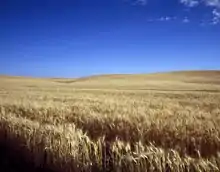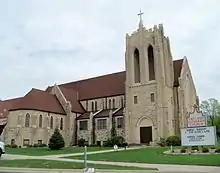Heartland (United States)
The heartland, when referring to a cultural region of the United States, is the central land area of the U.S.,[1] usually the Midwestern United States[2] or the states that do not border the Atlantic or Pacific oceans,[3] associated with mainstream or traditional values, such as economic self-sufficiency, conservative political and religious ideals, and rootedness in agrarian life.[2]

The US Census Bureau defines the Midwest as consisting of 12 states: Illinois, Indiana, Iowa, Kansas, Michigan, Minnesota, Missouri, Nebraska, North Dakota, Ohio, South Dakota, and Wisconsin. Portions of other non-coastal states can be included in the region as well. These may include eastern portions of the Mountain States (Colorado, Idaho, Montana, and Wyoming) and northern portions of some Southern states, such as Arkansas, Kentucky, Oklahoma, Tennessee, and West Virginia. One part of this is the Suburbs, the United States Census Bureau has found to be Middle-class.
Location

There is no consensus as to the geography of America's heartland. However, the American Midwest is the most commonly cited area as being the nation's heartland, although many other places have been referred to as part of it, often extending to rural or farming regions in the great plains.[4][5] At least as early as 2010, the term Heartland has been used to refer to many so-called "red states", including those in the Bible belt.[6]
According to the United States Census Bureau, the mean center of population in the U.S. in 2010 was in or around Texas County, Missouri. In 2000 it had been northeast from there, in Phelps County, Missouri. It is projected for the mean center of population to leave the Midwest and enter the Western U.S. by the middle of the 21st century.[7]
The geographic center of the 48 contiguous U.S. states is near Lebanon, Kansas. When Alaska and Hawaii were admitted to the Union in 1959, the geographic center of the United States moved from Smith County, Kansas to Butte County, South Dakota.
Use of the term
.jpg.webp)
Halford Mackinder, a British geographer, coined the word in 1904 to refer to the heart of the Eurasian land mass: a strategic center of industry, natural resources and power.[4] The use of the term "heartland" to apply to the American Midwest did not become common until sometime later in the 20th century.[8][2][9]
Culture
Heartland rock musicians such as Bruce Springsteen, Bob Seger (Michigan), Melissa Etheridge (Kansas), John Mellencamp (Indiana), and Tom Petty have sung about heartland values. Heartland rock albums include Springsteen's Nebraska. The genre is not necessarily Midwestern, as Springsteen was born in New Jersey, and Petty was born in Florida and has sung about the Southern United States, such as in his album Southern Accents. Modern artists of heartland rock include The Killers, The War on Drugs, and Jack Antonoff.[10]
See also
References
- "heartland". merriam-webster.com. Retrieved August 2, 2020.
- The American Midwest: An Interpretive Encyclopedia, pp. 71-73 (2006)
- Brownstein, Ronald (November 4, 2010). "Heartland Headache: Democrats have to be more competitive in states that don't touch an ocean if they want to bounce back". National Journal. Archived from the original on November 25, 2010. Retrieved November 5, 2010.
- Badger, Emily; Quealy, Kevin (2017-01-03). "Where Is America's Heartland? Pick Your Map". The New York Times. ISSN 0362-4331. Retrieved 2017-05-16.
- "HEARTLAND - What is Heartland". Heartlandeindhoven.nl. Retrieved 2017-05-16.
- Boyer, Paul S., Clifford E. Clark, Karen Halttunen, Joseph F. Kett, and Neal Salisbury. The enduring vision: A history of the American people Volume II: Since 1865. Cengage Learning, 2016.
- Yen, Hope (March 8, 2011). "US 'heartland' near historic shift from Midwest". Forbes. Associated Press.
- Imagined Heartland, Frontier to Heartland, Newberry Library (2009), Retrieved 4 February 2015
- "Google Ngram Viewer". Books.google.com. Retrieved 2017-05-16.
- Jeremiah Tucker. "Jeremiah Tucker: Heartland rock could see major resurgence this year". The Joplin Globe. Retrieved November 18, 2020.
Further reading
- Kristin L. Hoganson, The Heartland: An American History 2019